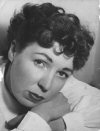 I recently acquired a copy of a book (Poems) by the nearly-forgotten, and great, modernist poet Lynette Roberts (pictured here).
I recently acquired a copy of a book (Poems) by the nearly-forgotten, and great, modernist poet Lynette Roberts (pictured here).Importantly, Carcanet has now republished her work, out of print for nearly 50 years, as the Collected Poems, edited by the poet Patrick McGuinness (http://www.patrickmcguinness.org/).
See the review in today's Guardian: http://books.guardian.co.uk/review/story/0,,1727423,00.html
It is extraordinary, especially in this climate of interest in the experimental aspects of language, that Roberts is not a name on the tip of everyone's tongue. At any rate, when modernist poetry is at its best, it clears the palate and raises the roof beams like no other sort of language can, and deserves not to be obscured but clarified, and welcomed. So it is I offer a quote from the Carcanet site, below:
Lynette Roberts was born in Buenos Aires of Welsh stock in 1909 and died in West Wales in 1995. She published two collections of poems in her lifetime, both from Faber and Faber: Poems (1944) and Gods with Stainless Ears (subtitled ‘A Heroic Poem’, 1951).
She married the Welsh writer and editor Keidrych Rhys, and came to know some of the prominent writers and artists her day. T.S. Eliot was her publisher and advocate. Roberts helped Robert Graves with his work on The White Goddess, and Dylan Thomas was best man at her wedding. She was a friend of Wyndham Lewis (who painted her), Edith Sitwell (to whom she dedicated Gods with Stainless Ears) and Alun Lewis (for whom she wrote ‘Poem from Llanybri’), and published in a variety of magazines in Britain and America.
The work of an original, haunting and experimental woman modernist poet is made available again, for the first in 50 years. Lynette Roberts is principally a war poet, in that her two published collections take as their subject a woman’s life in wartime. But she is also, or therefore, a love poet and a poet of the hearth. A late-modernist, she works on two scales at the same time: the mythic and the domestic. Those poets and readers who have valued Roberts’ work have been experimentalists. Even at this distance, she challenges and instructs, at the level of diction, syntax and achieved form.
She relentlessly opens out the language of poetry, she is free with extremes of subject, scale and conception, and her work has flourished in its very marginality. Now, with republication, she is restored as an extraordinary poet in the development of twentieth century British poetry. As a Welsh writer, her best work stands alongside that of her near-contemporaries, David Jones, R.S. Thomas and Dylan Thomas. As a woman poet, her work bears comparison with that of both Mina Loy and Djuna Barnes.
http://www.carcanet.co.uk/cgi-bin/scribe.cgi?author=robertsl
Comments